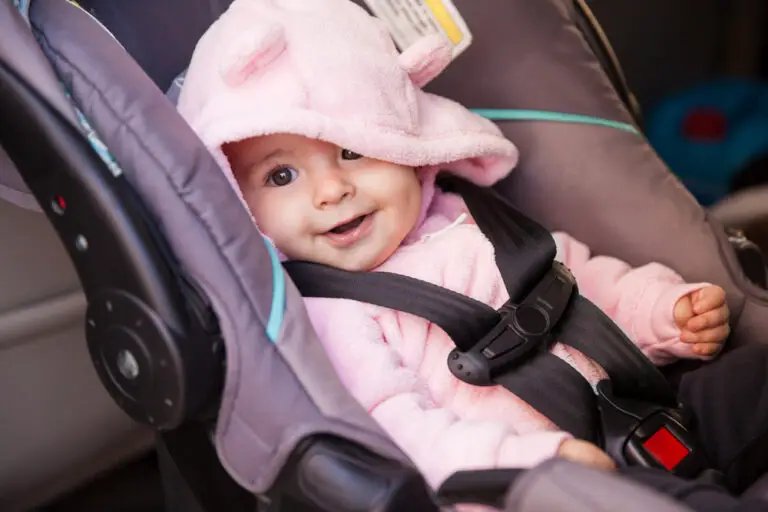Iowa Car Seat Laws 2024 (Rear, Forward & Booster)

As per Iowa car seat laws, all children under the age of 18 years have to be properly secured in a car seat that is appropriate for their age. This means a rear-facing seat for infants and forward-facing or booster seats for toddlers and young children. There is a scheduled fine of $135 for violating the law.
Disclaimer: This content does not constitute legal advice. It is solely for informational purposes. Always check the original source of the law for the latest version.
- Rear-Facing
- Forward-Facing
- Booster
- Front Seat
- Seat Belt
- Taxi Seat
- Ridesharing Seat
- Replacement
- Alone in Car
- Choosing a Seat
- Installation Help
Iowa Car Seat Laws
Iowa Rear-Facing Car Seat Law
According to the rear-facing car seat law in Iowa, a child less than 1 year old and weighing under 20 pounds must be secured in a rear-facing seat. (1)
An infant rear-facing seat should be placed in the backseat if available. It must never be placed in front of an active airbag.
The rear-facing car seat age in Iowa is 1 year. But the American Academy of Pediatrics (AAP) recommends keeping your child in the rear seat for as long as possible or till 2 years of age. Once they outgrow the maximum limits prescribed by the manufacturer, they can move to a forward-facing seat.
If you violate the Iowa rear-facing child seat law, you will be guilty of a simple misdemeanor. It carries a penalty of $135. (2)
Age: Newborn to 1 year
Weight: Less than 20 pounds
Penalty: $135
Iowa Forward-Facing Car Seat Law
There is no specific forward-facing car seat law in Iowa. According to Iowa car seat regulations, a child under the age of 6 years shall be secured in a forward-facing car seat. (1)
The forward-facing car seat age in Iowa is 6 years and younger. Ideally, you should keep your child in a forward-facing seat till they reach their maximum height and weight limits as prescribed by the manufacturer. Most forward-facing seats can carry children up to 65 pounds or more.
A violation of Iowa forward-facing child seat law is a simple misdemeanor. The driver will be responsible to pay the scheduled fine of $135. (2) If they can show the court that they have purchased a car seat since being charged, they will not be convicted.
Age: 1 to 6 years
Weight: More than 20 pounds
Penalty: $135
Iowa Booster Seat Law
There is no definite child booster seat law in Iowa. A child at least 6 years old should be secured in a booster seat. (1) Depending on your vehicle, it can include a high-back or a backless booster seat.
The booster seat age in Iowa is not definite. However, children should start using booster seats after they outgrow the height and weight limits of their forward-facing seats. They should continue riding in a booster seat till the seat belt fits them properly.
Iowa booster seat requirements do not apply to a child who has been certified by a licensed physician of having a physical, medical or mental condition that precludes them from using a child restraint.
The driver will be fined $135 for a violation of the child seat requirements in Iowa. (2)
Age: Under 6 years
Penalty: $135
Iowa Child Front Seat Law
There is no child front seat law in Iowa. The AAP recommends keeping children in the backseat till they are at least 13 years old.
However, if you are carrying your child in the front seat, then they must be placed in a car seat that is appropriate for their height and weight as per the requirements under Iowa child seat laws. A rear-facing seat must never be placed in front of an active passenger-side airbag.
For a forward-facing and booster seat, the vehicle seat must be pushed as far away from the dashboard as possible because airbags, if deployed, can injure children.
Even though a front seat age in Iowa is not mentioned, it is best to follow the guidelines of the AAP as the backseat is the safest position for kids.
Age: 13 years and older (recommended)
Iowa Child Seat Belt Law
According to the child seat belt law in Iowa, all children between the ages of 6 and 18 years have to be secured in an adult safety belt if they have outgrown the booster seat. (1) These requirements must be followed whether they are seated in the front seat or the backseat.
If there is a violation of Iowa children’s seat belt law, the parent or legal guardian traveling with the child will be responsible if the child is less than 14 years old. Otherwise, a passenger older than 14 years will be charged for not wearing a seat belt.
Seat belt rules in Iowa do not apply to a child who is physically, medically or mentally unable to wear a seat belt and the same certified by a licensed physician.
Age: 6 to 18 years
Penalty: $135
Iowa Taxi Child Seat Law
According to the taxi child seat law in Iowa, taxicabs are required to follow the car seat laws in Iowa. However, if the child passenger is under 14 years of age, the parent or legal guardian traveling with the child will be responsible for ensuring that they are properly restrained.
The taxi driver is not responsible for having a taxi child seat in Iowa. As a caregiver, you should make sure that your child is properly restrained. If your child is under 1 year old and less than 20 pounds, secure them in a rear-facing seat.
If they are under 6 years old, you should put them in a forward-facing seat with a harness. (1) Use a booster seat if your child is older than 6 years.
Iowa Ridesharing Child Seat Law
There is no clear ridesharing child seat law in Iowa. As per Iowa state law, all children under the age of 18 must be secured in a car seat or seat belt. (1) However, there is no mention of who should provide a child seat. Nor does the law mention ridesharing services such as Uber and Lyft.
Under the law, the parent or legal guardian traveling with the child will be responsible if the child is under 14 years of age and they are not properly secured.
In such a case, you should carry your rear-facing, forward-facing or booster seat when traveling in a rideshare service. This way, you will avoid violating the law while also observing maximum safety for your child.
Iowa Child Seat Replacement Law
There is no specific child seat replacement law in Iowa. But if your car is involved in a moderate or severe accident in Iowa, you must replace the child safety seat. It may have defects not visible to the eye.
However, if your vehicle suffered a low impact accident, there is no need to automatically replace the car seat.
A low-impact crash is one where there is no visible damage to the car seat, the passengers are not injured, the vehicle door nearest to the car seat is not damaged and the vehicle could be driven away from the accident site.
Apart from child seat replacement after an accident, you must also replace it if it has been recalled or is more than 6 years old.
Leaving Child in the Car in Iowa
There is no law on leaving a child in a vehicle in Iowa. But there are many risks associated with leaving a child unattended in a vehicle. The most common danger is heat stroke.
The temperature inside the vehicle can rise suddenly. Since children’s bodies heat up faster than adults, they are at great risk of suffering a heat stroke. Other dangers include the child getting kidnapped, setting the car in motion, getting strangled by seat belts or power windows or having some other in-car accident.
Even though leaving a child in the car in Iowa is not technically illegal, it may be covered under other serious provisions of child endangerment. Thus, never leave a child alone in a vehicle, even for a few minutes.
Choosing a Child Car Seat in Iowa
When you are choosing a car seat in Iowa, you can refer to the recommendations of the National Highway Traffic Safety Administration (NHTSA).
From the time your child is born till they turn at least 1 year old, a rear-facing car seat is the best car seat to use in Iowa. Once they outgrow it, they can then move to a forward-facing seat with a harness.
After they reach the maximum height and weight limits of the seat, they can move to booster seats. A seat that props your child up to allow the seat belt to fit properly is the best booster seat to use in Iowa.
Car Seat Installation Help in Iowa
To comply with the law, child passenger safety seats in Iowa must be installed as per the manufacturer’s instructions. In addition, you also have to follow your vehicle manual to ensure that the seat is properly attached.
It can be a tedious task. For your assistance, Iowa has different stations with certified Child Passenger Safety (CPS) technicians. You can get your car seat checked or installed and also learn more about child passenger safety. Some of the stations where you can get assistance are:
- Dubuque Police Department
- Johnston Police Department
- Iowa City Fire Department
- North Liberty Police Department
- Ankeny Police Department
Iowa Car Seat Safety Resources
Some of the resources for car seat safety in Iowa are:
- City of Iowa City: The official website of Iowa City, it contains information on the car seat law, national standards for car seats as well as other common safety tips and mistakes that people make with regard to car seats.
- The Iowa Clinic: A leading hospital in Iowa, it contains a pediatrician’s guide to safe use of car seats.
- University of Iowa Stead Family Children’s Hospital: Established in 1919, it provides childcare services to families and children. It also provides car seat checks and contains valuable resources on car seat recommendations and types of restraints.
FAQ
How long should a child ride in a rear-facing car seat in Iowa?
A child should ride in a rear-facing car seat till the age of 1 year. But they should continue riding rear-facing till they outgrow the seat.
Can you put a rear-facing car seat in the front seat in Iowa?
It is best to put a rear-facing car seat in the back. If you do put it in front, the front seat airbag must be deactivated.
Can you put a rear-facing car seat in the middle rear seat in Iowa?
You can put a rear-facing car seat in the middle rear seat but it must fit properly. Check the car seat as well as your vehicle’s manuals.
When can a baby face forward in a car seat in Iowa?
A child can face forward after they have turned 1 year old or have outgrown the maximum height and weight limits of their rear-facing seat.
How old for a booster seat in Iowa?
There is no specific age mentioned in the law. But children should ride in a booster seat once they outgrow their forward-facing seat according to its manufacturing limits.
When to use a backless booster seat in Iowa?
You can use a backless booster seat if your vehicle seat has a headrest and the child’s ears are not higher than the seat back.
When can a child sit in the front seat with a booster in Iowa?
Children should ideally ride in the backseat till they are 13 years old. But if unavoidable, they can ride in the front seat with a booster with the seat pushed back.
When can a child stop using a booster seat in Iowa?
A child can stop using a booster seat when they turn 6 years old. Ideally, they should stop using a booster when the seatbelt fits them properly.
When can a child sit in the front seat in Iowa?
Children are safer in the backseat of the vehicle. But they can sit in the front seat in an appropriate child restraint if it is absolutely necessary.
When to switch from 5 point harness to a seat belt in Iowa?
When the child outgrows the height and weight limits of the 5-point harness, they can switch to wearing a seat belt in a booster seat.
When can a child use a regular seat belt in Iowa?
Under the law, a child can start using a regular seat belt once they are 6 years old. However, they should only wear a seat belt if they are at least 4’9” tall and the seatbelt fits them properly.
Do you need a car seat in a taxi in Iowa?
Yes, taxis are not required to follow child restraint laws. You should carry an appropriate car seat for the maximum protection of your child.
Do you need a car seat in a Uber in Iowa?
The law does not mention ridesharing services like Uber. But as the parent/legal guardian, you should carry a federally approved and appropriate car seat.
Do you need a car seat in a Lyft in Iowa?
The law does not mention ridesharing services. But as the parent/legal guardian, you should carry a federally approved and appropriate car seat for your child.

Rishima Rawat
Rishima Rawat is a lawyer and legal writer with over six years of writing and legal experience. She earned her LLB degree from the West Bengal National University of Juridical Sciences, Kolkata. With a passion for child safety, she’s written extensively about the U.S. car seat laws in ParentingMode. She collaborates with businesses and law firms globally, enhancing their online content. Her insights are also published in legal journals like RGNUL, NLIU, and RMLNLU Law Review. Committed to the cause of education, she has volunteered with IDIA, which helps underprivileged children in India to access legal education. She has also worked with Enhelion Knowledge Ventures, a leading legal ed-tech platform in India that provides students with affordable courses in law. Fluent in English and Hindi with elementary proficiency in Spanish, Rishima combines her legal expertise with a dedication to child safety.






